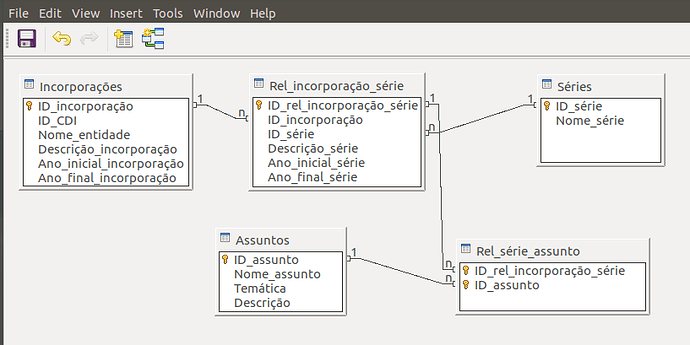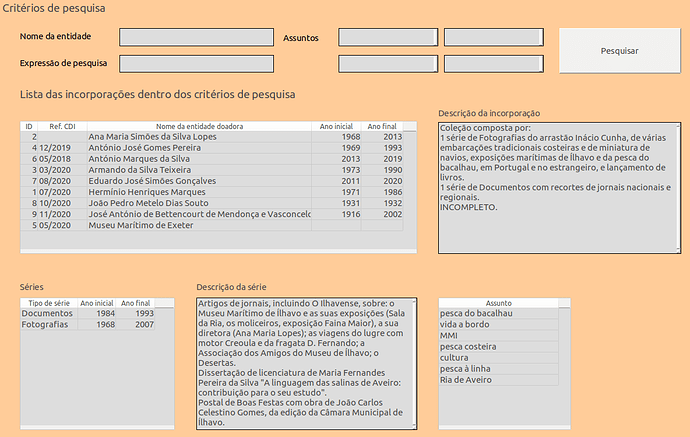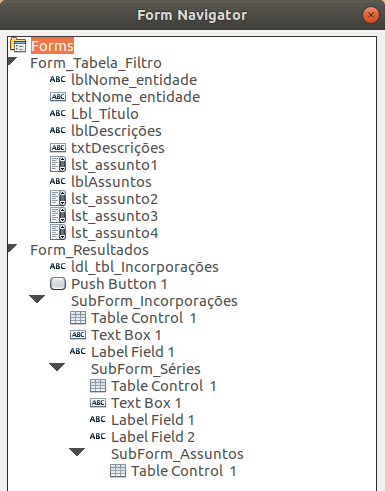Hello.
Using the definition of Libreoffice Base manual (https://documentation.libreoffice.org/assets/Uploads/Documentation/en/BH4.0/PDF/BH40-BaseHandbook.pdf p. 198-201), I need to build a query for filtering/searching data in multiple tables, avoiding information repetition.
I am using version 6.0.7.3 of Libreoffice Base, with the default SQL language (HSQLDB).
DATABASE DESCRIPTION
I am building a database for some donations to an archive.
Each donation (“Incorporações”) has the following fields:
- the donation’s primary key (“ID_incorporação”);
- the name of the entity that donated the documents (“Nome_entidade”);
- a brief description of the donation (“Descrição_incorporação”);
- the oldest known year in which the documents of the donation were produced (“Ano_inicial_incorporação”);
- the newest known year in which the documents of the donation were produced (“Ano_final_incorporação”).
Each donation is divided into series. The series itself are defined by a table (“Séries”) that has the following fields:
- the serie’s primary key (“ID_série”);
- the type of the serie (“Nome_série”).
The relation of the series with the donations (that has a many-to-many nature) is represented in a table (“Rel_incorporação_série”) that contains:
- its unique primary key (“ID_rel_incorporação_série”);
- the donation’s foreign key (“ID_incorporação”);
- the serie’s foreign key (“ID_série”);
- a full description of the donation’s documents belonging to that serie (“Descrição_série”).
Each series within the donation also have some keywords attached. The keywords, in an identical way to the series, are defined by a table (“Assuntos”) that has the following fields:
- the keyword’s primary key (“ID_assunto”);
- the name of the keyword (“Nome_assunto”);
- the type of the keyword (“Temática”);
- a description of the keyword (“Descrição”).
Finally, I have made a table for recording which keywords each series has (“Rel_série_assunto”) that contains only two fields, defining, together, the table’s primary key:
- the foreign key regarding the relationship of the serie with the donation (“ID_rel_incorporação_série”);
- the foreign key of the keyword (“ID_assunto”).
I have placed a picture of all these tables with all the relationships.
PROBLEM DESCRIPTION
- I want to filter the various series that are contained in the donations (any field in “Rel_incorporação_série” table) by its keywords (“ID_assunto”).
- I want to search for words in the series’ and in the donation’s descriptions (“Descrição_incorporação” in “Incorporações” table and “Descrição_série” in “Rel_incorporação_série” table), ideally using only one field as the search criteria.
- I want to search for words in the entities that donated the documents (“Nome_entidade” in “Incorporações” table).
- I don’t want any repetition of information.
Using a filter table, for storing the filter/search criterias, I created a form for this purpose. I am trying to make one big query, using the examples given in the refered pages of the manual, showing all the information on a subform through a single table. The problem with that solution is that the table captures all the repetitions, regarding how much series I have in a donation, but must important, how much keywords I have in each serie.
Here is the query I tried. “Tabela_filtro” refers to the filter table, while “Nome_entidade”, “Descrições” and “ID_assunto1” to “ID_assunto4” to the fields contained in it. Thus, I have added, in the filter table, a field for searching for the name of the entity that donated the documents (“Nome_entidade”), only one field for searching both the donation’s as well as the serie’s descriptions (“Descrições”) and 4 separate fields for filtering multiple keywords (“ID_asssunto1” to “ID_assunto4”).
SELECT * FROM “Incorporações”, “Rel_incorporação_série”, “Rel_série_assunto” WHERE (LOWER (“Nome_entidade”) LIKE IFNULL (( SELECT ‘%’ || LOWER (“Nome_entidade”) || ‘%’ FROM “Tabela_filtro”), LOWER (“Nome_entidade”))) AND (LOWER (“Descrição_incorporação”) LIKE IFNULL ((SELECT ‘%’ || LOWER (“Descrições”) || ‘%’ FROM “Tabela_filtro”), LOWER (“Descrição_incorporação”))) AND (“ID_assunto” = IFNULL((SELECT “ID_assunto1” FROM “Tabela_filtro” ), “ID_assunto” )) AND (“ID_assunto” = IFNULL((SELECT “ID_assunto2” FROM “Tabela_filtro” ), “ID_assunto” )) AND (“ID_assunto” = IFNULL((SELECT “ID_assunto3” FROM “Tabela_filtro” ), “ID_assunto” )) AND (“ID_assunto” = IFNULL((SELECT “ID_assunto4” FROM “Tabela_filtro” ), “ID_assunto” ))
Other solution that I tried was to SELECT only the donation or the series table, but then I couldn’t define all the conditions because some of them returned more than one value.
Maybe it’s better to approach the problem with several subforms or several tables, where the actual real number of donations, series and keywords appears. But I don’t know how to do that.
I simply want to solve the given points, using a form (I am willing, if its impossible to execute, to abdicate 3. and even the capability of search in the donation’s descriptions). Can you help me?



